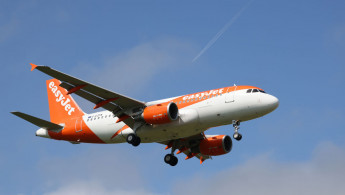EasyJet cancels dozens of flights as Covid-19 hits staff in Europe
EasyJet on Monday said it was cancelling flights to and from the UK after high Covid rates in Europe left the British airline with a lack of staff.
It comes as the global aviation industry, despite recovering after lockdown curbs were lifted, has come up against a new costly headwind in the form of soaring fuel costs.
EasyJet rival Ryanair on Monday revealed it expected to post a net loss of at least €350 million ($384 million) in its financial year just ended.
That compared to a loss of at least €250 million ($275 million) in an earlier forecast made by the Irish carrier.
EasyJet said separately that "as a result of the current high rates of Covid infections across Europe, like all businesses... [it] is experiencing higher than usual levels of employee sickness".
After cancelling more than 200 flights over the weekend, EasyJet said it had preemptively cancelled 60 for Monday.
The airline noted that it was a "small proportion" of the more than 1,645 flights planned for the day.
"We have taken action to mitigate this through the rostering of additional standby crew, however, with the current levels of sickness we have also decided to make some cancellations in advance," EasyJet said in a statement.
In the UK, rates of Covid infection have hit a record high, according to official data on Friday.
Some 4.9 million people in the UK are estimated to have had Covid-19 in the week ending 26 March, or 600,000 more than the previous week, the Office for National Statistics said.
The World Health Organization has said that several European countries, including Britain, France, Germany and Italy lifted their Covid curbs too "brutally" and are seeing a rise in cases likely owing to the more transmissible BA2 variant.
Surging fuel costs
Ryanair on Monday added that its net loss for the 12 months to the end of March 2022 would at most hit €400 million ($439 million), down on a previous estimate of €450 million ($494 million).
The Dublin-based carrier also said it had increased its hedging to cover 80 percent of its jet fuel refined from crude, which has surged in price as economies reopen from lockdowns and on tight supply fears after major oil producer Russia invaded Ukraine.
Airlines seek to bet against volatile oil prices by hedging - or taking a defensive position on futures markets.





 Follow the Middle East's top stories in English at The New Arab on Google News
Follow the Middle East's top stories in English at The New Arab on Google News
![The UAE is widely suspected of arming the RSF militia [Getty]](/sites/default/files/styles/image_330x185/public/2024-11/GettyImages-472529908.jpg?h=69f2b9d0&itok=Yauw3YTG)
![Netanyahu furiously denounced the ICC [Getty]](/sites/default/files/styles/image_330x185/public/2024-11/GettyImages-2169352575.jpg?h=199d8c1f&itok=-vRiruf5)
![Both Hamas and the Palestinian Authority welcomed the ICC arrest warrants [Getty]](/sites/default/files/styles/image_330x185/public/2024-11/GettyImages-2178351173.jpg?h=199d8c1f&itok=TV858iVg)